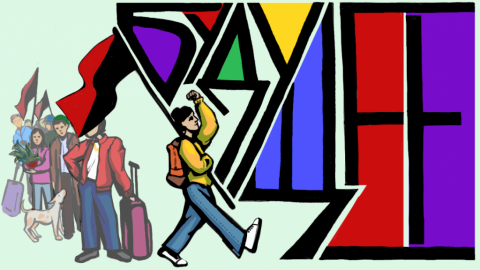
Anarchism on the periphery: struggle under conditions of emigration and war
This text was written by a small group of Russian anarchists. We are not in Russia and are actively engaged in revolutionary struggle in another country.
In this article we examine the current situation of the anarchist movement in the Russian Federation and in emigration, draw conclusions about its readiness for revolutionary events, and share our thoughts on what should be done now.
Today Russian anarchist movement is in bad situation. But this is not a reason to give up, quite the contrary. There are advantageous circumstances in all difficult situations, and we must use them. Right now the Russian emigration has such an opportunity.
We are convinced that revolution in Russia is possible and necessary. The anarchist movement must participate in taking down the regime and join processes of social changes under political regimes that will come after.
Without a strong movement we won't be able to act in a coherent and organized way in upcoming revolutionary events. We do not consider success of anarchism in the post Soviet countries possible without anarchist organizations - above-ground and social, combat and underground. That's why in this text we are calling for creation of organizations, making it possible to shape a united and coherent movement that can rise to the challenge of our times.
We consider it necessary to analyse Russian political emigration and seek to draw useful lessons from it. Our analyses are not complete and focus on only a few aspects that are important to us specifically. In the process of these reflections we make critical remarks, with the aim of motivating those people who will find what is expressed in this text interesting and important. We are writing primarily for people from Russia. We see the need for greater unity in the anarchist movement, the need for organised struggle and internationalism as a revolutionary tradition. This text aims to share this vision.
We realise that the idea of "revolutionary struggle", as well as many of the other formulations we use, may be unclear and seem unrelatable to everyday reality for many of the readers of this text, our close friends, and even for those with whom we share this very struggle. We believe that it is essential to define for ourselves this idea, its concept and meaning. We need to envision ourselves in it and draw conclusions for our lives and priorities. This is a basic component and a first step for personal and collective orientation in current events if we are to not only understand them, but actively participate in them as an anarchist movement. So despite any discomfort you may have in reading this, we ask you to focus on the essence of what’s written, and encourage you to engage in discussion about it.
Another important concept for us is BUR (Belarus, Ukraine, Russia). Although this abbreviation may seem outdated or even problematic, we find it quite appropriate in view of the Russian Federation's imperial project and its implications for Belarus and Ukraine.
Anarchism and the global crisis
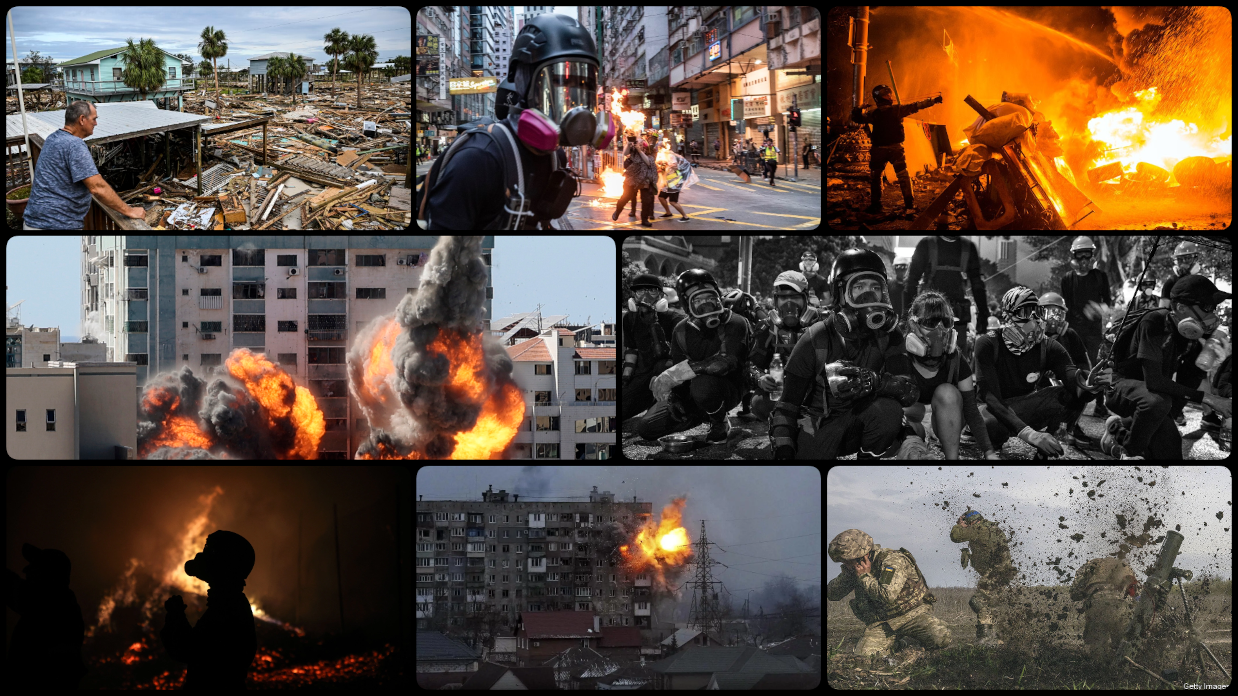
The third anniversary of Russia's full-scale invasion of Ukraine is just around the corner, and it has been 10 years since the war began. This war is shaking up geopolitical maps, changing military doctrines, claiming hundreds of thousands of lives, bringing to the fore the crimes of the Putin regime and the bravery of the Ukrainian people in the face of such a threat. At the same time, Israel is wiping Gaza off the face of the Earth, invading Lebanon, while other long-smouldering military conflicts in the Middle East and beyond are escalating. The current state of affairs on the peripheries of empires and former colonies gives us clear clues about possible future scenarios. The number of wars will increase, militarisation will grow, and more and more people will be pushed out of their lands, doomed to dehumanisation, to the position of a migrant labour force, banging against the deaf walls of the visa fortresses of first-world countries in an attempt to gain legal status for their families.
In the dystopian future thus envisioned, anarchist ideas grow more relevant, not less. Other ideas of social organisation that do not strive for radical direct democracy, equality, the elimination of human oppression and the cessation of the destruction of the planet have already proven to be untenable and disastrous. Nevertheless, the current of projects for a free society are not in their strongest at the moment.
Where are we, anarchists, in this global picture? A significant part of the anarchist movement in Belarus and Russia is currently in exile. In trying to generalise and understand its situation, we can outline some thoughts that we hope can help us to overcome the current state of the anarchist movement. Since we ourselves have come out of the context of internal Russian colonialism, our understanding of Belarusian emigration is based only on our comrades' retelling of experiences and observation of their external work, so we will concentrate on what we have seen with our own eyes and about which we have a better understanding.
Challenges, losses and hopes
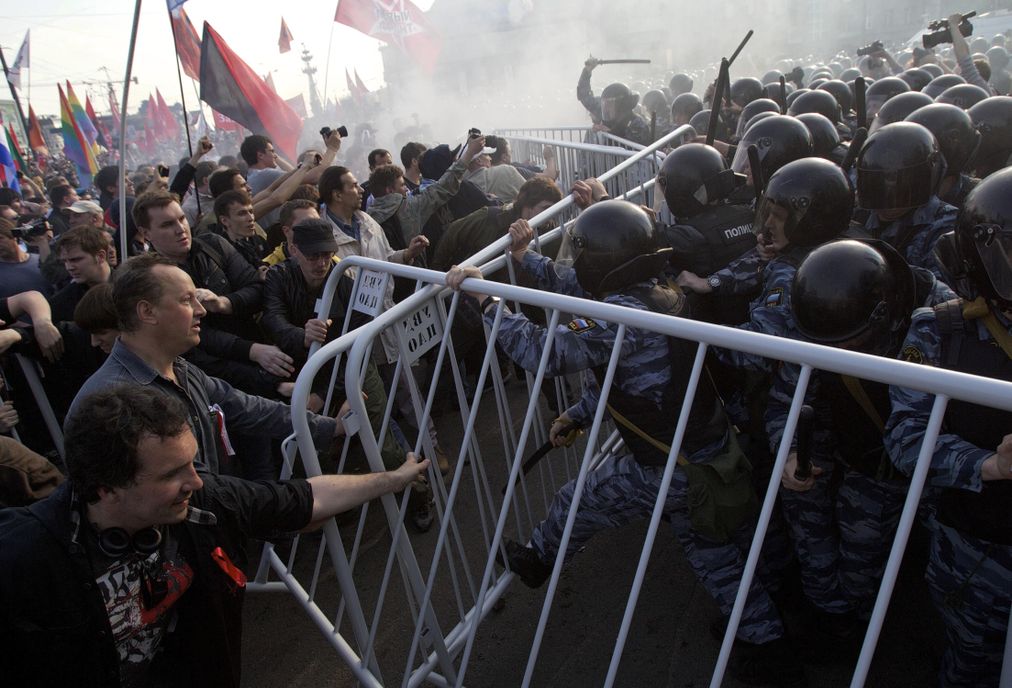 Confrontation at the Bolotnaya square in Moscow. May 6th 2012
Confrontation at the Bolotnaya square in Moscow. May 6th 2012
The situation in which anarchism in BUR finds itself is a difficult one. Over the last fifteen years the movement has experienced a series of defeats: the failure of the protests in Russia in the early 2010s; the ousting of the organised anarchist force from the Maidan in Ukraine and the rise to power of a new elite; the effective repression of the anarchist movement in Russia and Belarus that put dozens of people behind bars; the defeat of the protests and uprising in Belarus in 2020; the failure of the anti-war resistance in Russia in 2022 that led to the exodus of thousands of politically active people and the imprisonment of hundreds. As a movement we have lost and continue to lose comrades: deaths in battle or on the streets, suicides, imprisonment. But internal factors also play a role, for example, disillusionment: with many leaving in search of another way of fulfilment in life, or with the many crises of relationships within the movement, including interpersonal violence, incidents of which often remain unresolved. However, these problems are not unique to our context; they are found in all human communities. At the same time, one can clearly see hope and the will to change: lessons from the past are analysed and discussed, mistakes are worked on, comrades in prison are supported, and the memory of those who died in battle is cherished. Prisoners and the fallen remind us of the need to continue the struggle and to strive for the development of the movement.
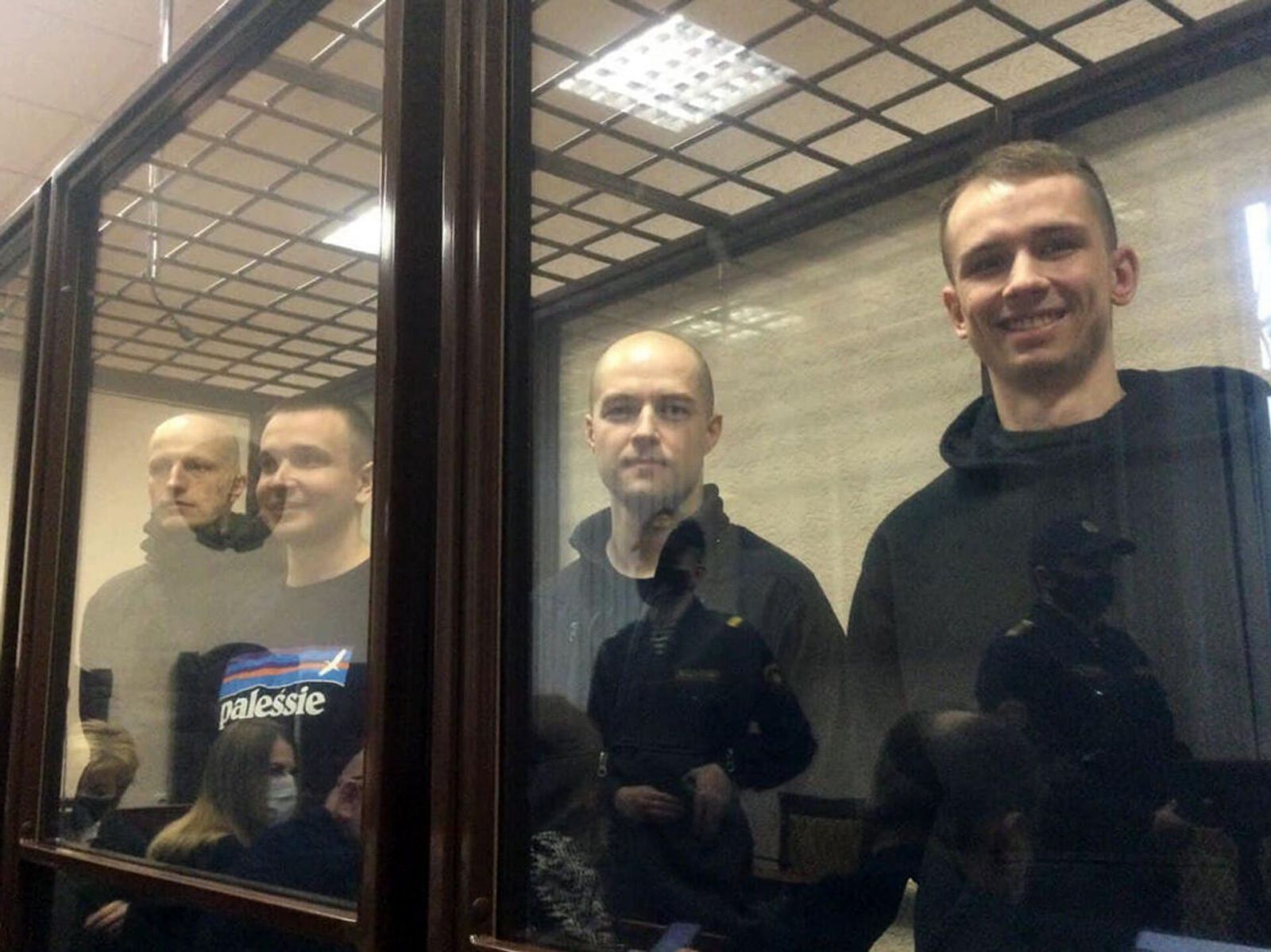
Anarchist partisans. Ihar Alinevich, Dmitry Dubovsky, Dmitry Rezanovich, Sergey Romanov
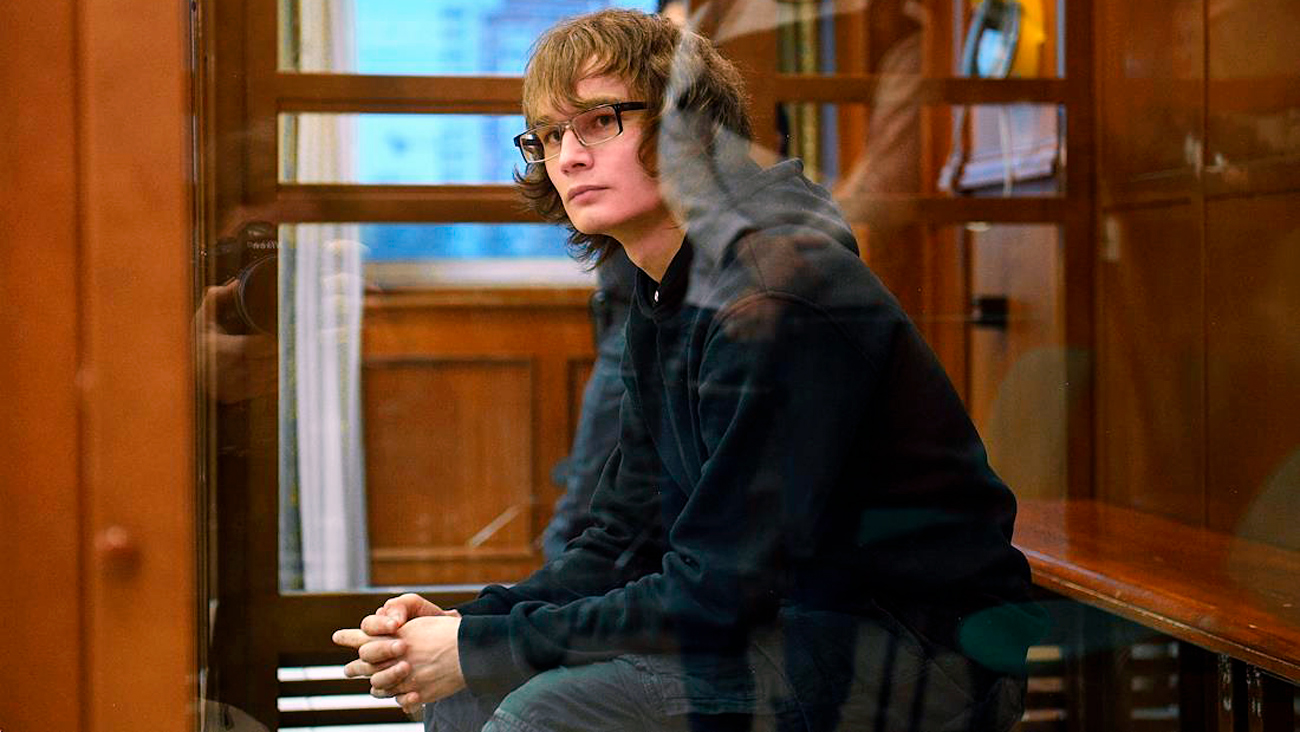
Azat Mikhtakhov, an anarchist and a mathematician from Moscow
We want to particularly emphasise the significance of the Russian war in Ukraine for anarchist movements in BUR, because it is an event that has disrupted the usual order. The diversity of views on Ukrainian comrades’ participation in the war exposed many problems in the understanding of anarchism. Narrow ideological views and dogmatism of some parts of the international movement has led to criticism of the Ukrainian movement and the groups that support it in the struggle. At the same time, a real war is taking place in Ukraine, in which thousands of people, including our comrades, are dying. The Ukrainian experience is extremely important and relevant: the work of the Solidarity Collectives, the organisation of the Anti-Authoritarian Platoon, the continuation of activities under the conditions of military invasion should serve as examples for us, and not become occasions for attacks.
Now the anarchist movement in BUR is small in number and is represented in several spheres: political prisoners and their support in Belarus (ABC-Belarus) and Russia (Solidarity Zone), armed resistance to the Russian invasion of Ukraine in the ranks of the Armed Forces of Ukraine (AFU) under the emblem of the Resistance Committee and the activities of Solidarity Collectives, the partisan movement (Combat Organisation of Anarcho-Communists, the anarcho-partisans now in prison and Black Nightingales), collectives and projects engaged in diverse work (Antijob, Akrateia, DIAna, Black Square, Tolko Sami), as well as emigration (Pramen, Egalite, book publishing and media - Avtonom). There are also many people who sympathise with anarchist ideas but for one reason or another do not find a place in existing organised activity.
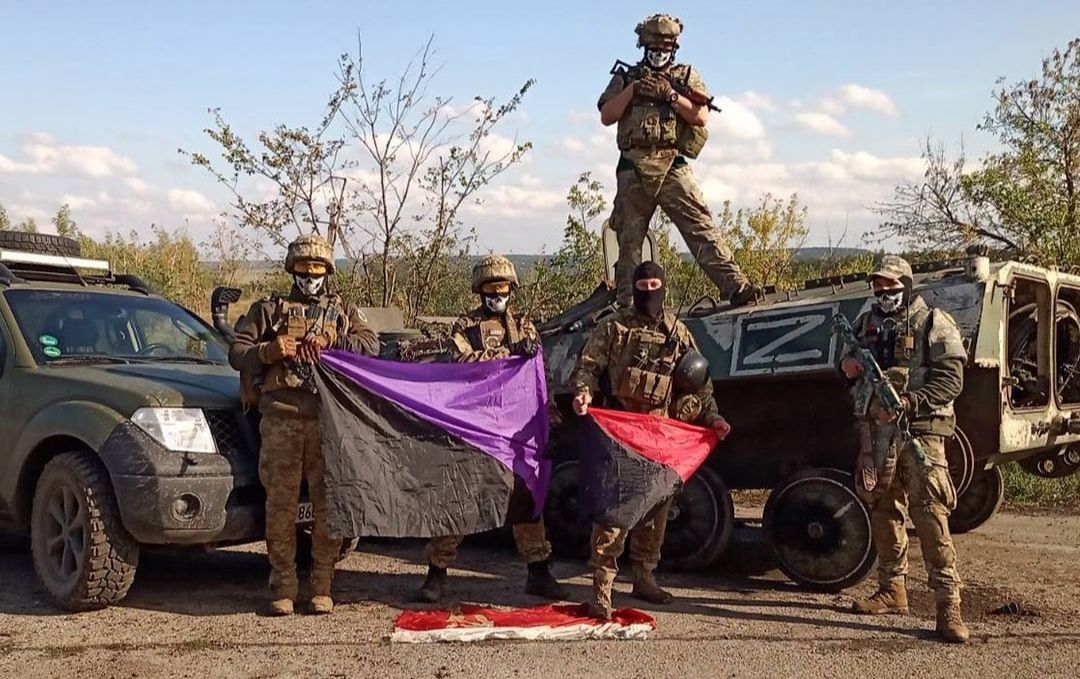
Anarchists at the front of resistance to Russian invasion
It is also worth noting that the position of the anarchist movement in Russia is of key importance not only for Russian anarchists, but also for Belarusian and Ukrainian comrades. Lukashenko's dictatorial regime is completely dependent on Putin's regime, and the stability of the latter guarantees the preservation of the former, just as the continuation of the war in Ukraine is directly connected with the unleashed ambitions of the Russian top brass. The failures and setbacks of the Russian anarchist movement, the inability to organise the struggle in such a way as to significantly destabilise the influence of the empire in Belarus and Ukraine, constrain the potential actions of comrades there. There is a good article about this relationship by Pramen [https://pramen.io/ru/2024/10/destabilizatsiya-rossii-kak-put-k-svobode-v....
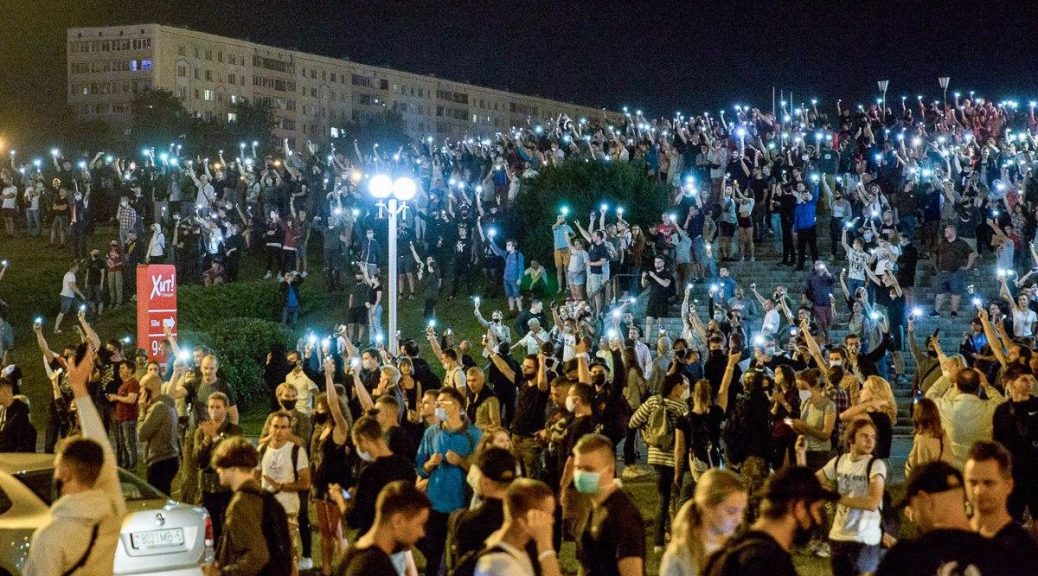
A moment from uprising in Belarus. 2020
The problem and potential of emigration
Anarchists from BUR found themselves quite often in European countries before 2022: they escaped repression, went away to study or work, crossed the borders of states through mountains and forests to establish connections and organize activities in foreign countries. Nowadays it is a more mass phenomenon. The main waves of emigration from Russia took place in the spring and autumn of 2022, with the overwhelming majority of those who left going to nearby Armenia, Georgia and Kazakhstan. The first two countries became havens for the majority of anarchists, leftists, liberals and less politically determined people. Over time, various projects and initiatives came to be realised there, and the community itself formed enclaves of sorts, without building strong ties with local movements. Unfortunately, this emigration can most easily be characterised as problematic from an economic, political and cultural point of view. The former Soviet republics are still bearing the consequences of colonisation by the Russian Empire and the USSR, a tradition which Russia continues today by maintaining its influence in these countries. The waves of Russian emigration brought with them not only political dissidents who were unable to continue living under the regime's already open aggression and repression. With them came unexamined colonial culture, metropolitan consumerism in the service sector, rising prices and other problems affecting the places that received them. This could be described as a new spontaneous and often unconscious colonisation of territories already occupied by Russian culture and economy. This is important to keep in mind when talking about the new Russian emigration, which in scale and meaning has been compared to the emigration of Soviet dissidents during and after the Russian Revolution. Back then, the routes were mainly to Western Europe and the United States, and the emigrants were in a different position in relation to the local cultures of the "first world" countries.
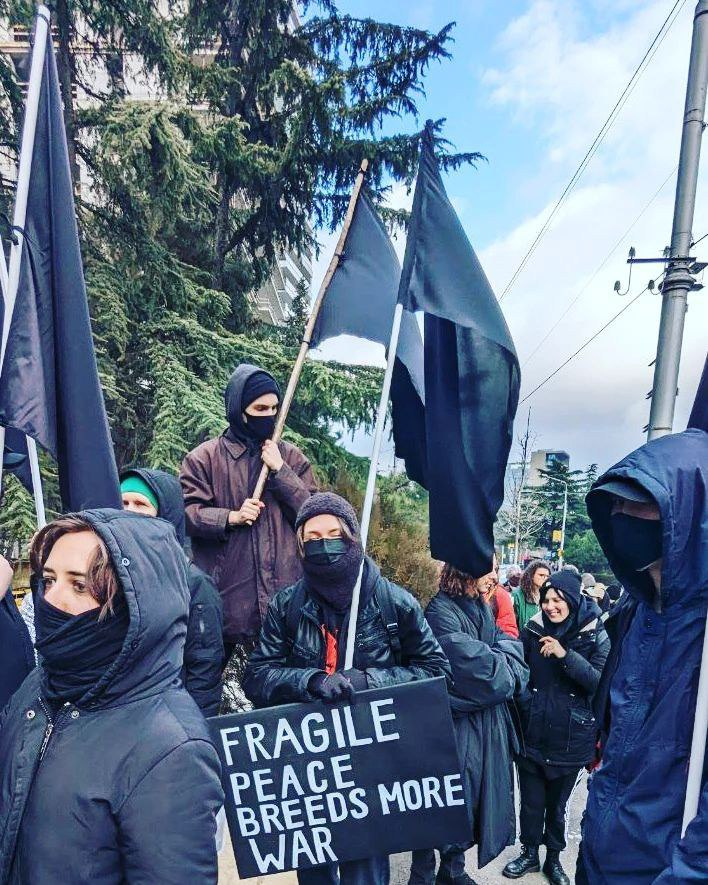
Anarchists at the demonstration in support of Ukraine in Tbilisi, Georgia.
Approaching the scale to a more familiar reality and taking a closer look, we can say that the mood in emigrant anarchist circles and projects in Georgia and Armenia seems ambiguous and the general situation is precarious. In all of this we can note a tendency: many people are feeling rather depressed. Apart from despondency and a lack of will to act, there are cases of suicide and many people struggle with mental health. This is influenced by the difficult financial situation, problems with addictions and irresponsible drug use, a constant search for funds, lack of confidence in the future and lack of any prospects. These factors are further aggravated by the serious problem of interpersonal violence and frequent conflicts within small communities. It should be noted that these problems existed and were quite widespread in the anarchist milieu even before emigration. Expectedly, these problems came along with the people from this milieu, and were further complicated by the insularity of emigrant groups in the new environments of unfamiliar countries. However, there is also a constructive tendency in these communities, for example, to explore conflict resolution mechanisms and approaches to justice. Some parts of the expatriate anarchist community work hard in this direction, and devote a lot of energy to supporting friends in difficult situations. This work often coincides with the labour of reflecting on the influence of patriarchy in the community and dealing with its various consequences.
The instability is also seen in the frequent movement of people from one project to another, as they try to find something that gives meaning, but at the same time does not encroach on personal comfort. Nevertheless, there is no idea what to do with life. Usually communities provide stability, collectivity and some kind of support. Not finding this, people naturally follow learned individualistic and atomised modes of existence. In this case, values such as struggle, comradeship and organisation are not readily understood. In our movement right now it is even hard to talk about a strong ethical foundation as an expected minimum for everyone. But if this is so, then what are the defining values now? Personal financial success, a certain level of comfort and an excessive focus on partnerships come to the fore. Because of this, one often can observe resistance to anything that requires giving up much of this comfort to which the capitalist system has accustomed us. The core value in this context is individualism. It allows us to think of ourself as an independent unit, separate from other people and the world around us. This thinking orientates a person first of all to organise his or her own life in isolation from other people and to be unwilling to see themself as a part of something bigger in a global perspective.
Here we see one of the tasks of any revolutionary movement: to give reason and motivation to voluntarily sacrifice comfort and belief that it is not for nothing. Because we see that even with the full-scale war in Ukraine and the deaths of hundreds of thousands, relatively few people in the politically conscious part of the Russian population found reasons to sacrifice their comfort and fight against the regime.
A particular phenomenon felt in Georgia and Armenia, but also present in European emigration, is the artistic milieu from Moscow and St. Petersburg, which discovered political struggle and anarchist principles after Navalny's imprisonment and the full-scale invasion of Ukraine in 2022. Given the deplorable state of the anarchist movement, it is somewhat disconnected from anarchist ideology itself and the history of the movement in Russia. This example highlights the need for ideological discussion that can support a high level of ideological training. Such training is very important because it provides the foundation for the anarchist struggle, without which it will be impossible to engage in it effectively. In our view, Belarusian School of Anarchism has been moving in the right direction and can serve as an example and inspiration in this endeavour.
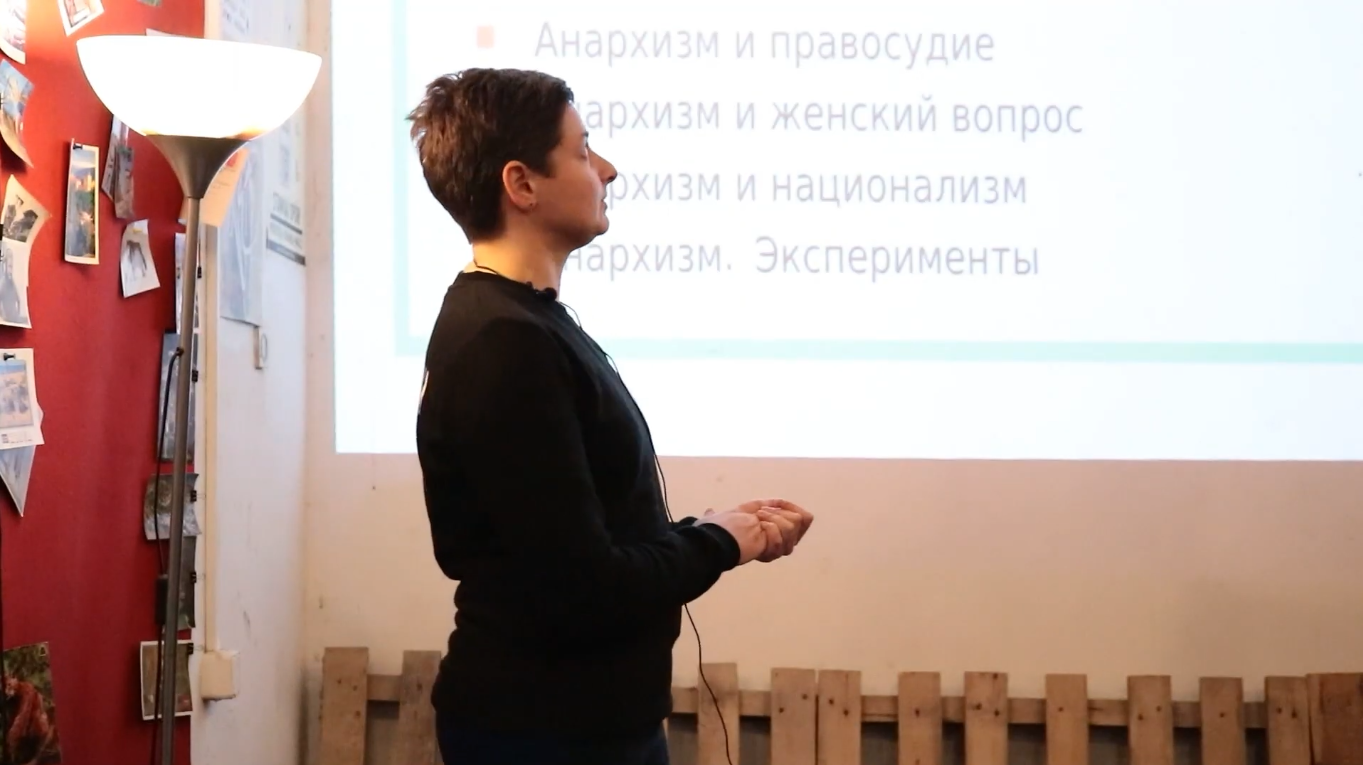
Lesson at the Belarusian School of Anarchism.
Another reason for the need for ideological training is that the political imagination of Russian anarchist emigration has been undermined by collapsed organisations and collectives, Soviet and post-Soviet experiences, repression, isolation and failure. These factors should not be taken as excuses, but as a reality that we have had to face and which have much to teach us. Nowadays, however, post-irony is often the main ideological approach to the challenges of emigration, war and the need for revolution. This attitude prevents us from taking events seriously and giving them meaning. Post-irony helps to deal with difficulties and stress on a personal level through distancing and mocking the big and difficult questions which, nevertheless, require answers. For example: Russia has fully revealed its authoritarianism, started a full-scale war, and we are in exile. What do we do about it? How to act honourably? Most of us cannot give a concrete answer to this question, because many of us think and answer as individual people who do not see themselves in such large-scale categories as resistance or a revolutionary movement. But we need to start thinking in these terms. Although there is no revolutionary movement at the moment, there is certainly resistance to the regime and the necessary preconditions for the rise of such a force.
Nevertheless, emigration has great potential. For example, it can bring new people in. We see material mutual aid and educational projects as good channels for opening the doors of the anarchist movement to people in emigration who want to contribute to the destruction of Putin's regime. It is possible and necessary to enter the non-anarchist Russian emigrant environment with clearly formulated ideas, concrete proposals and ways of realising them.
All of the above is often not a problem of emigrants alone. For the last 10 years there has not been a united organised movement in Russia. Therefore, we realise that we cannot expect that anarchist emigration, with all its difficulties, will suddenly have concrete ideas and a direction of action. Nevertheless, we cannot but mention the experience of the Belarusian comrades who have been in emigration for many years and who have been active. Unfortunately, the Russian emigration has scarcely looked to this experience, and direct co-operation and common struggle have not been established. The absence of an organised movement makes these tasks difficult. Yet, in our opinion, existing collectives and projects could devote more time and effort to this kind of co-operation. The same can be said about the links with the Ukrainian anarchist movement: we consider criticism from Ukrainian comrades about insufficient or ambiguous support and weak attempts at contact to be very important and serious. The conclusion from this criticism is not that we are bad and guilty. The main conclusion we see is this: we need a cohesive and effective movement, for which we need organisations. Then we can develop not only a worthy struggle against the regime, but also prepare for what comes after.
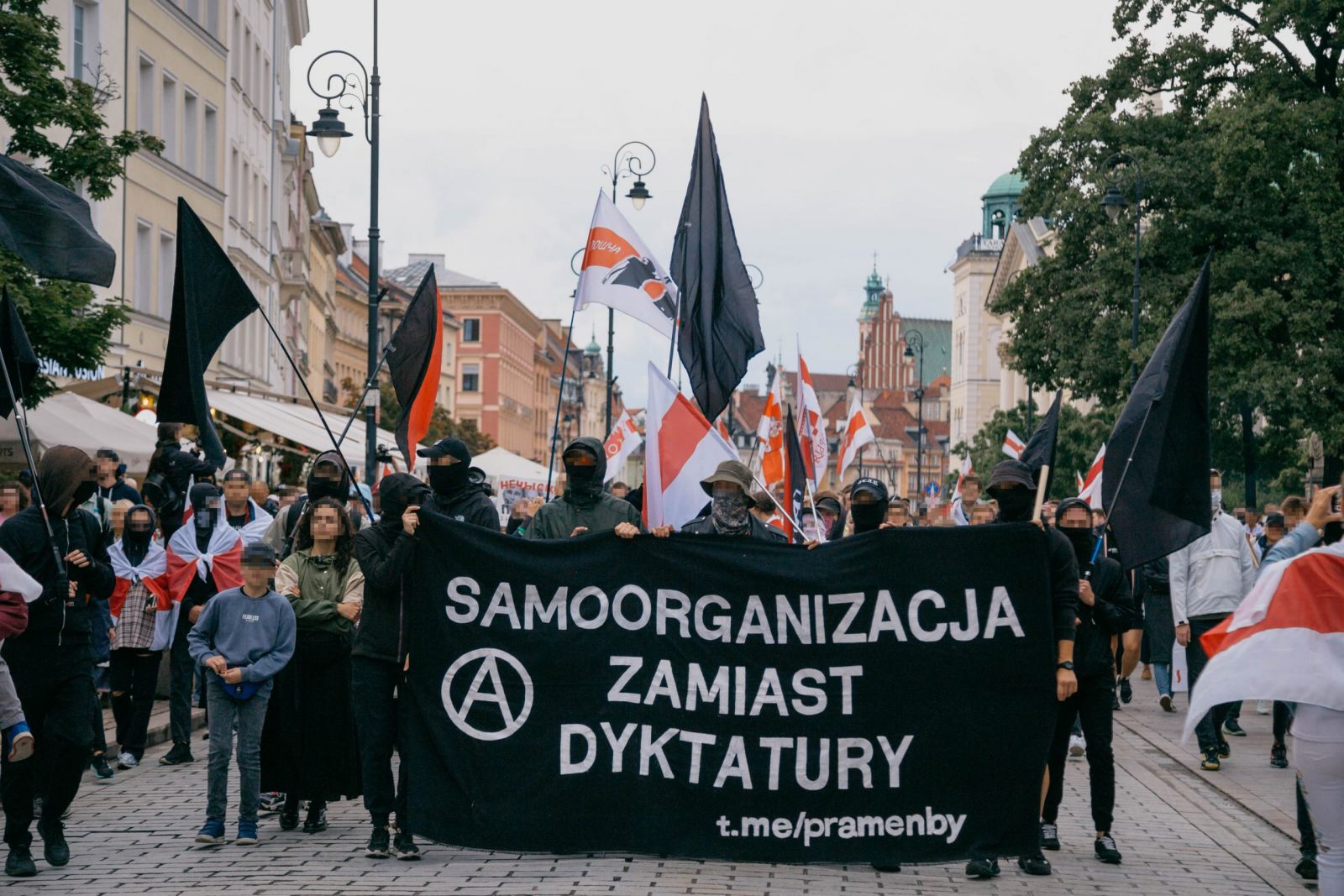 Belarusian anarchists at the demonstration in Poland.
Belarusian anarchists at the demonstration in Poland.
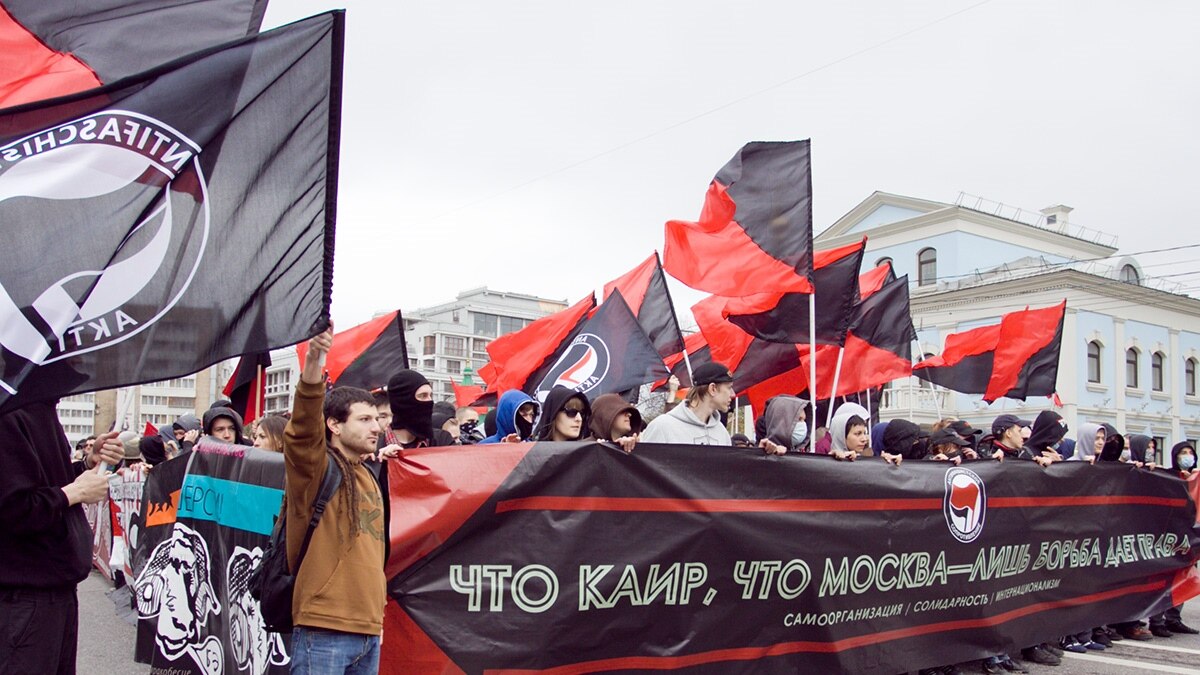 Events of the Arab Spring became an inspiration for the anarchist movement.
Events of the Arab Spring became an inspiration for the anarchist movement.
10 years without an organisation
There is much to think about and discuss, and this is already being done - for example, the Dogma podcast, which has collected many relevant and important contemporary experiences, critiques and voices from the anarchist movement. Yet the necessary analysis of the condition of contemporary anarchism in the BUR has yet to be done, as a holistic view is not yet available. It is necessary for the realisation of the ideas of a free society after the fall of the Russian regime. This analysis would allow the anarchist movement to understand its history, its shortcomings and advantages, to unite and act as a strong movement that can realise its proposals for society. At the moment we are not such a movement, and it is particularly painful and frustrating to realise this while comrades are dying in Ukraine and a desperate struggle lies ahead.
Let's take a look at the event that only few of those currently active in the anarchist movement have witnessed: split and demise of Autonomous Action (AA). Ten years have passed since that event. This federative interregional organization had chapters in many cities accross the whole country and existed since 2002. This organization had many shortcomings and problems, but also AA as such was needed and had meaning. For that reason its loss, signifying the ongoing decline of the organized movement in Russia, became a massive set back for the subsequent generations of anarchists. It was not the first organisation in the RF to disintegrate, but this case is particularly memorable because it had cross-regional implications. Deep reflection, work on mistakes and reorganisation were needed and could have prevented the decline of anarchism in Russia that had already begun at that time. Instead, with the collapse of Autonomous Action we arrived at disillusionment, lack of ideological principle and hostility that fragmented the anarchist movement in Russia and undermined its potential for years to come. We moved on to isolated projects and less formal types of organisation: collectives, affinity groups, personal projects. In and of themselves, these things are not bad at all. However, if that's all we have, it becomes a problem. Despite the excellent examples of ABC-Belarus, Solidarity Zone, Antijob, Solidarity Collectives - they are only a fraction of the strength that could be realized by a more organised movement.
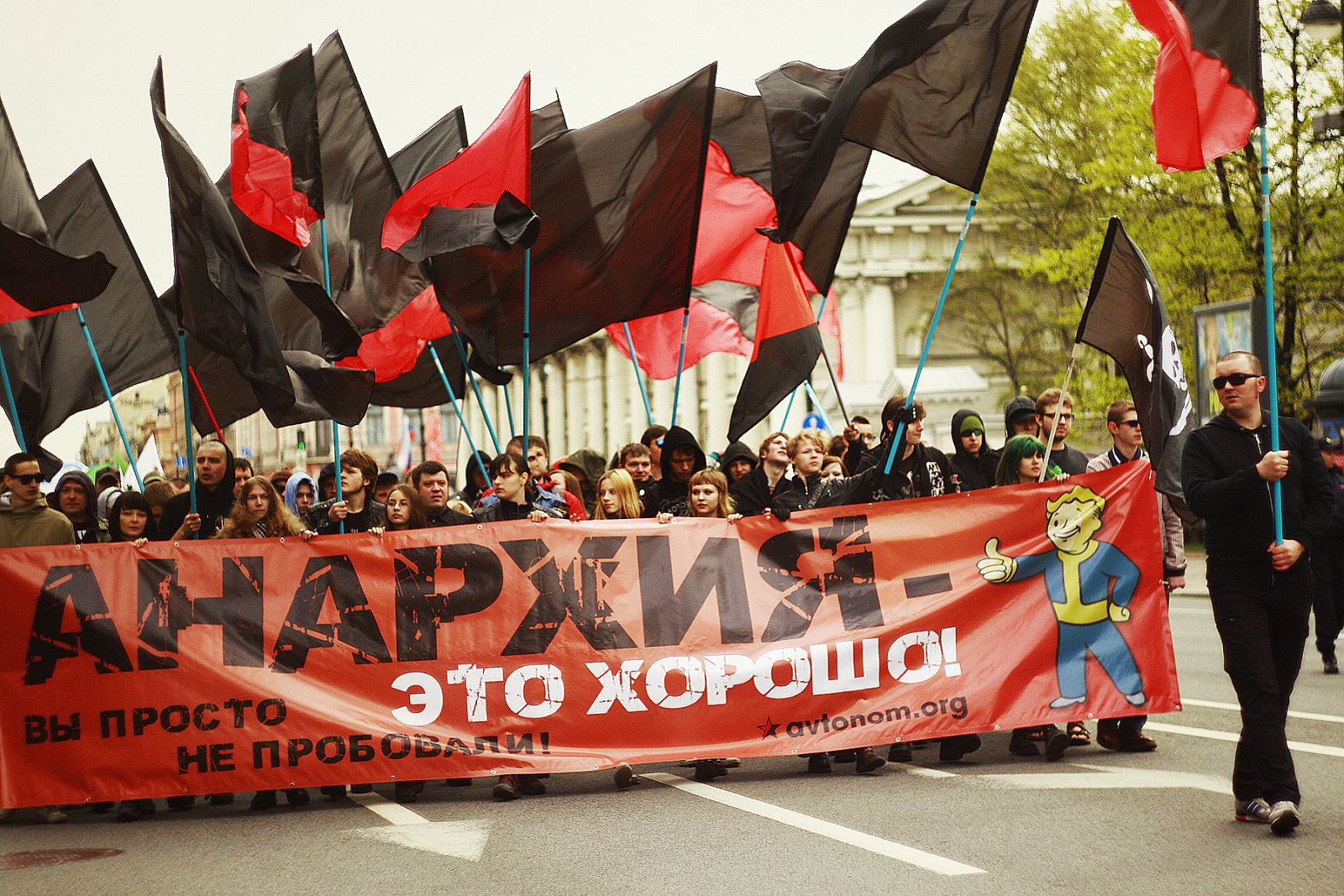
Visiually the Autonomous Action was most known thanks to its recognizable banners and slogans in Moscow and St. Petersburg.
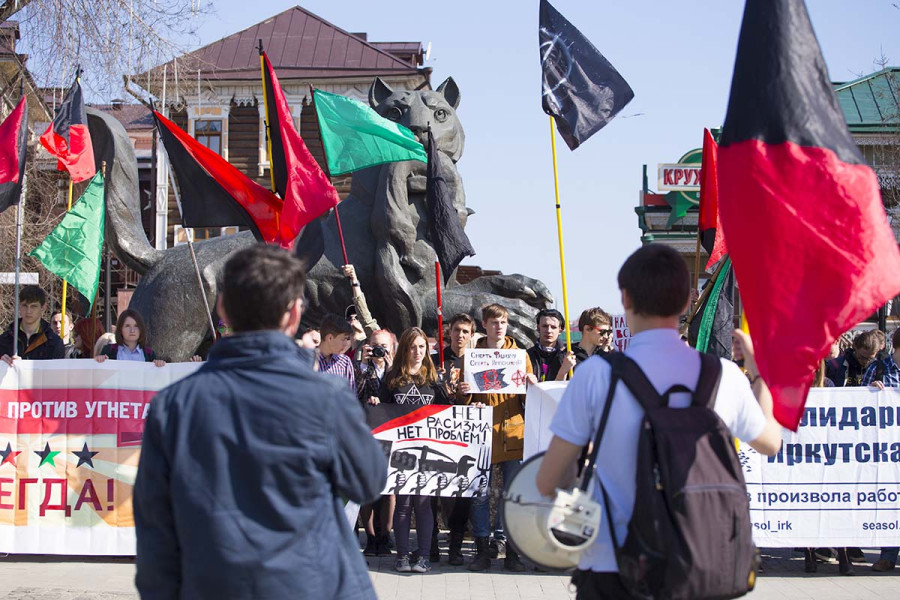
One of the most organized long-term groups was Irkutsk chapter of the Autonomous Action. At the picture we see a street protest organized by the Movement of Irkutsk Anarchists, its successor. 2017
Projects and people are scattered around the world and often poorly connected to one another. Non-constructive conflict and, more importantly, a lack of global vision and willingness to join forces beyond a small group of people contibute to this weakness of connection. This leads to a lack of shared and accessible movement infrastructure and resources: from finance, transport and housing to people, knowledge, skills and the ability to mobilise the movement as a coordinated force. This deficiency is crowned by the lack of formal anarchist organisations with a long-term perspective, a political programme, clear goals and committed people.
We are already experiencing the consequences of this shortcoming today, with each new round of global events. We are generally not keeping up with their development and are not adequately preparing for the challenges and opportunities ahead of us in the near and distant future. As we have already written, there will be more and more wars and invasions, regimes will lose stability, and emerging crises may again lead people to self-organise and confront the state. The general problem anarchists are facing is that our readiness for such turns of events is low. If the movement fails to seize these opportunities, they will be seized by other forces, or quickly slammed shut. The result then is likely to be the opposite of what we want: instead of uprisings against the regime, we are likely to see people rallying under its flag. This problem keeps us in a position from which the most we can do is react symbolically to what is happening, without the ability to take initiative and develop our own vision on a more global level. There is no doubt that those of us who have observed this process several times over the past decades in different countries have experienced much pain and frustration, and are prepared to go to great lengths to prevent this picture from unfolding before our eyes again.
Our brief assessment of the position, resources and readiness for action of anarchist movements in BUR paints a complex picture. It is not surprising that talk of a coherent and organised anarchist movement in BUR often provokes either incomprehension or rejection and ironic bitter chuckles. And yet these thoughts are already being voiced - both by anarchist Alexei Makarov, who participates in the armed resistance to the Russian invasion, and by BOAK, which conducts partisan warfare in the Russian Federation. Moreover, these thoughts slip into private conversations among people in exile. The idea is not new; it is in the air, waiting to be put into practice.

Alexey Makarov: It's time to put our efforts on forming a united, organized anarchist movement everywhere.
In summary, we can say that in its current situation the anarchist movement is not living as an organism capable of combining diversity and unity, spontaneity and organisation, idea and reflection, form and content, high standards and accessibility - the common characteristics of a strong revolutionary movement. In our view, without this capacity, the anarchist project has no chance of being successfully realised in BUR and beyond. We believe that the best version of our future lies in the direction of organised anarchism and an international movement.
How do we move forward?
From all of the above we can derive what the movement is lacking and what it should focus on. We see a direction for action in the following five areas.
Infrastructure and resources
There is a need for infrastructure that makes possible both organised mutual assistance in emigration and preparation for returning home - technical, financial, tactical, ideological. Now is a good time to build such infrastructure and find resources without attracting attention, given the choice of good locations and distance from Russian law enforcement.
Political analysis
We need a detailed analysis of the current political and social situation in Russia and the world, study of history, to gain a better understanding of our place in it. All this will allow us not only to familiarise ourselves with what has happened, but also to think strategically, to anticipate probable scenarios of events, to develop plans for each of them and to be flexible. A possible programme for an anarchist movement also requires this analysis. It is not a question of academic work: it should be the tool of all ideologically prepared anarchists. Every comrade needs to be able to analyse the situation, draw conclusions about it and make decisions accordingly.
Studying the anarchist emigration of the past is a useful work that could help us draw lessons from previous century. A good example can be Italian anarchist emigration in time period between 1874 and 1930. Even though fascism in Italy triumphed for some time, Italian anarchists and anti-fascists from other political currents succeeded in defeating fascism in their community and contributed to revolutionary struggle in other countries. Perhaps today we could learn something from their experience and strategies.
Another example can be the influence of emigré activities on political situation in Russia - starting with "The Bell" newspaper published by Alexander Herzen all the way through many anarchist circles who began organizing long before the revolutions of the start of 20th century.
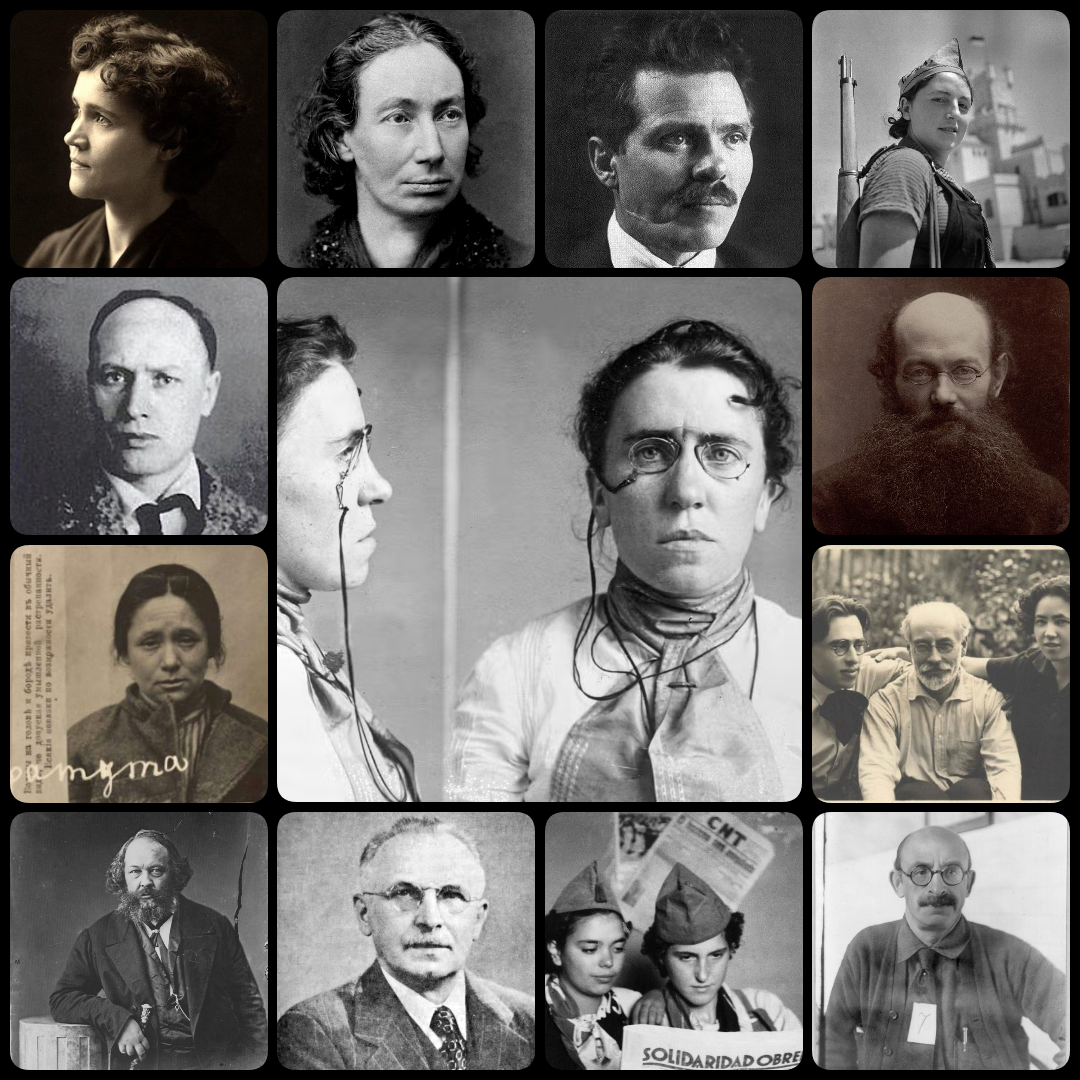
We should look to the experience and stories of the anarchists of the past, who were paved the path we are walking today.
Organisation
There needs to be a clear organisational structure and an understanding of its purpose. We now have time to prepare a clear and strong framework consisting of objectives, strategy, working methods and principles, networks, resource base, programme, common standards. We need to move beyond closed affinity groups and see the benefits that a more structured approach brings. This will also help to bring people back into the movement who have left because of its lack of seriousness and unresolved problems. An important part of this process is the transfer of experience from the "older" anarchist generation to the newcomers, to prevent repeated stepping on a rake.
Revolutionary personality
Participation in an organisation requires the development of certain qualities. It is necessary to develop a personality that combines discipline, dedication, faith, responsibility to the organisation, comradeship, political imagination, the desire to work on mistakes and self-criticism. It is very difficult to develop such a personality without an organisation, but it is also impossible to develop a revolutionary organisation without such a personality.
Not only the already mentioned ideological training, but also tactical training can help us in this. The Russian aggression has once again shown the need to acquire military skills that most anarchists do not have. However, to become militarised and take up arms is not only about physical self-defense, but also about developing a mindset that is based on discipline and responsibility.
Ideological and tactical training constitute a complex knowledge that requires training. It can only be learnt in specific contexts and with the appropriate infrastructure.
Revolutionary personality and organisation have been already well written about by BOAK.
Coordination
Establishing and re-establishing links with Belarusian and Ukrainian comrades is necessary both to better understand the regional context and to join forces. We should also look beyond the capitals Moscow and St. Petersburg, because there are struggles in the regions of the Russian Federation and abroad that could be the starting point for big events that will shape the course of events. To fight the regime, we will need the support of like-minded people from all over the world. We need aid of the organizations with already existing organizations and communities in the countries where we are ending up as emigrants. In them we can find ideological and resource base for creation of our own collectives and organizations.
Conclusion
This article is not the final truth, but an invitation to dialogue. The more voices are heard in our movement, the more different opinions and reflections, the more debates and search for solutions, the better we will understand our prospects and the necessary steps to achieve our goals. Obviously, there is a lot of hard work to be done to rebuild an anarchist movement that will be capable of real action and of support for its members, but if we really want to get to the level where we can give our contribution in overthrowing the Putin regime and Russian imperialism, this work must be our priority.
If you want to reach out to us with feedback or to follow up with a discussion, you can email us at: perifery@systemli.org

Add new comment